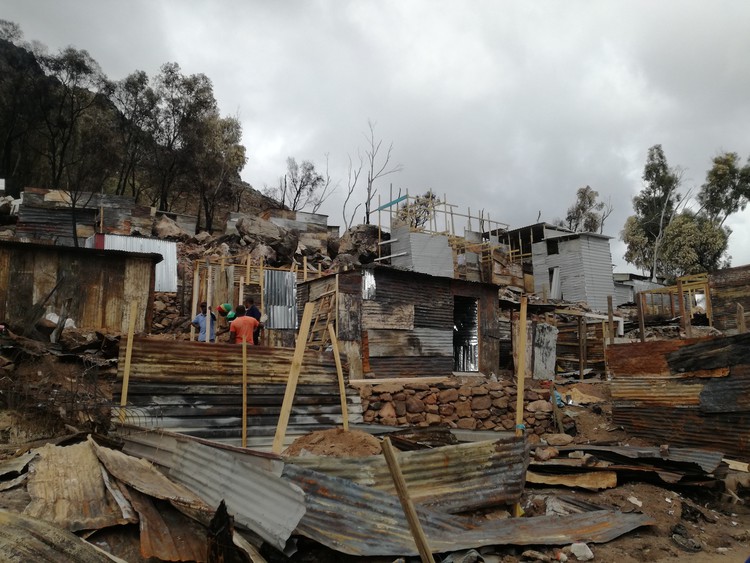Imizamo Yethu residents to oppose City interdict
Unresolved disputes over reblocking following fire
Many people in Imizamo Yethu continue to build their homes, despite an interdict by the City of Cape Town on 19 March. The interdict prevents some residents rebuilding their houses so that the area can be reblocked following a fire in March that left thousands homeless.
Reblocking is the process of creating space (or roads) between homes so that emergency vehicles can access the area during an emergency.
Residents in a section of the informal settlement called Shooting Range, where majority of the residents affected by the fire affected stay, oppose the City’s plan to reblock the area. But reblocking has begun in another section called Mandela Park.
Resident Pamela Sofika said they planned to oppose the interdict after a planned meeting with the City of Cape Town never happened on Friday. Loyiso Nkohla, the City’s community liaison officer, had apparently promised the residents he would meet them. Nkhohla is formerly with the activist organisation Ses’Khona. He did not respond to multiple requests for comment by GroundUp via the City’s usually very efficient media liaison desk.
But on Thursday Mayoral Committee Member Xanthea Limberg said that the City had a consistent presence on the ground, and was holding regular meetings with community representatives. “The City had an extensive engagement with the leadership of Imizamo Yethu on Tuesday and, following that, a meeting open to the entire community,” said Limberg.
Community leader Clifford Nogwavu said that residents intended to discuss with the City the issues concerning them about reblocking, and what they would like to see happen. Community leaders had stopped residents from building until the meeting happened, but since it did not take place, they have now told people to continue building.
The residents’ main concerns are that they will have to stay in tents during winter. They are also concerned that their homes will be smaller after reblocking.
Sofika, who has been living in Imizamo Yethu since 1995, said that on Saturday they sat with their lawyers to compile information to oppose the City’s interdict. “The City has no concrete plan but want us to agree to what they are saying without having all the information we need. Tents are non-negotiable for us. We do not want them. Period.”
“We asked them to put us in temporary houses, and they said they do not have money for that. They are selling us an idea which we can see is not possible,” said Sofika. She said they have also asked the City to wait till the new housing development in the area is finished so they can move people there.
A new housing development is planned for Imizamo Yethu more than 900 people will be beneficiaries of, said Sofika. “Why can’t they wait to move those people when the development is done? Then they can open the roads that they want to open. For now they must let us build,” said Sofika.
She has built one room of her three-room shack using recycled material from the fire, like most of her neighbours. She said she would finish her house once she had enough money to buy the material. She said she had no “hope” that the City would provide them with building kits.
Chwayita Matiso, an attorney with the Legal Resources Centre, is representing the residents. She said they were still consulting with the residents and gathering all the information before they can file opposing papers. Residents have until 1 June to file.
Support independent journalism
Donate using Payfast

Don't miss out on the latest news
We respect your privacy, and promise we won't spam you.
Next: Children at pre-school use the bush as a toilet
Previous: Young Khayelitsha musicians jazz with American pianist Nat Adderley Jr
© 2017 GroundUp. 
This article is licensed under a Creative Commons Attribution-NoDerivatives 4.0 International License.
You may republish this article, so long as you credit the authors and GroundUp, and do not change the text. Please include a link back to the original article.

